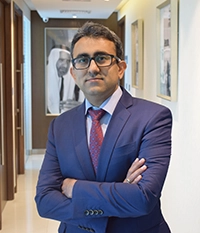Kreston SVP
April 11, 2024
April 11, 2024


Balakrishnan Karyot is a partner for Tax and Advisory at Kreston SVP. With a focus on international taxation, advisory, and indirect tax services, Balakrishnan offers expertise to a diverse clientele, ranging from businesses to owner-managed enterprises. Currently, he plays an instrumental role in advising corporate client groups in both India and Qatar, leveraging his deep knowledge and experience to navigate complex tax landscapes and offer tailored solutions
October 19, 2023
Investing in Qatar may be helped by the National Vision 2030 which outlines the nation’s approach to achieving sustainable development through a balance of economic diversification, education, healthcare, social protection, international cooperation, and environmental conservation. This a challenging vision for a nation that has a volume of oil and gas exports that places the country within the top five richest countries in the world has an unemployment rate of 0.1% and has a lower-than-average inflation rate of less than 3%.
We spoke with Balakrishnan Karyot, Partner at Kreston SVP in Qatar, to clarify some of the assumptions that can have foreign investors favouring the UAE. “Qatar is ranked third in the Middle East/North Africa region in terms of economic freedom,” Balakrishnan explains. The infrastructure of regulatory bodies, including the Ministry of Commerce and Industry and the Qatar Central Bank, creates a stable foundation for commercial ventures. “The Qatar Riyal being pegged to the US Dollar is a major advantage for trading,” Balakrishnan adds. “The Qatar Central Bank and the Qatar Financial Markets Authority also play pivotal roles in regulating financial activities and regulatory framework of the listed companies, respectively.”
Reflecting on the options available for setting up businesses, Balakrishnan explains, “Companies can set up their entities through various structures such as Limited Liability Companies, Partnerships, Branch, and Representative offices.” The prospect of full foreign ownership, subject to approval, and the availability of various specialised zones like the Qatar Financial Centre and the Qatar Free Zone, paint a picture of a nation eager to welcome international business. “There are generally no minimum investment requirements under state law; it’s dependent on the scope of the project .”
For those investing in Qatar, the favourable tax environment is notably appealing to businesses. Balakrishnan explains, “There are no personal income taxes on salary income in Qatar. Companies under the Ministry of Commerce and Industry (MOCI) and in the QFC are taxed at 10%. Moreover, entities in the Qatar Free Zone and the Qatar Science and Technology Park can enjoy a tax holiday for up to 20 years .” Addressing the essentials of payroll requirements, Balakrishnan advises, “The employees need to have a valid work and visa permit in Qatar and need to be registered under the Wage Protection System (WPS) in Qatar.”
Qatar’s GDP, with a striking figure of $225.3 billion(according to the World Bank), showcases a prosperous economy. The financial sector in Qatar is burgeoning, with 18 licensed banks and multiple financial institutions, insurance companies, and investment funds. “Kreston SVP, with a diversified portfolio and a team of over 50 employees, is positioned well in the market to deliver quality service to our clients,” Balakrishnan proudly states. The firm’s prominent role in In-Country Value (ICV) certifications further underscores its significant presence in Qatar.
With the FIFA World Cup attracting 3.4 million visitors and revitalising sectors like travel, tourism, hospitality, and retail, Qatar has experienced a near-term economic boon. “The development of the North Field LNG expansion project is anticipated to sustain this economic vigour, supporting overall growth and boosting exports .” The country’s commitment to diversification is evident, as Balakrishnan points out, with recent amendments in tax regulations focusing on Economic Substance regulations.
Qatar’s economy has relied on oil for economic stability and diversification can invite uncertainty. The ongoing need for economic diversification, the potential emergence of new COVID variants, fluctuations
in energy prices, and tightening global financial conditions could pose risks to Qatar’s economic health. A measured commitment to diversification, and a welcoming approach to international business, could help soften this transition for Qatar.
If you are interested in doing business in Qatar, please contact Kreston SVP directly, or get in touch.


Ganesh has extensive experience of more than 30 years in providing specialist tax services, particularly to large privately owned groups, with particular strengths in the property, retail, healthcare and hospitality industries. He has supported various entities with specialist advice on tax-effective structures and restructures, cross-border transactions on account of outbound and inbound India investments, mergers, acquisitions and divestments. Ganesh has also worked with stakeholders across businesses to deliver solutions such as tax due diligence, tax consolidation and restructuring of large family businesses in the Middle East, Asia, and Singapore.

Surandar Jesrani is the CEO and Managing Partner at MMJS Consulting. A chartered accountant by qualification and entrepreneur by nature, Surandar prior to founding MMJS was in key positions at HSBC Private Equity, Infosys, L&T and GM.
Surandar is a thought leader and the leading newspapers in the region frequently seek his views. Surandar is a speaker at various International forums and was recognized as ‘Corporate Icon of the Year’ for three consecutive years.
December 5, 2022
The Accountant Magazine recently highlighted the impact of the OECD two-pillar solution to control impact of BEPS on GCC (Gulf Co-operation Council) countries. Two tax experts from Kreston Global, Ganesh Ramaswamy, Partner at K Rangamani and Associates LLP in India and Surandar Jesrani of Kreston Menon shared their thoughts with The Accountant on the region’s readiness to adopt the new framework.
As the global economy becomes increasingly more digitalized, the OECD made the decision to update the framework on base erosion and profit sharing. Pillar one impacts the multi-national enterprise (MNE) with a turnover of more than 20 billion and profits before tax of over 10%. Pillar two is seeking a global tax rate of at least 15%.
Parts of the region have been in a position to be able to adopt the pillar two framework with relative ease. Multiple countries within the GCC are already positioned to be able to adopt the 15% tax rate, with Oman already in that position. A 15% corporate tax rate exists for non-GCC companies in Kuwait with Saudi Arabia already exceeding the expectations at 20%. Bahrain and UAE currently have no corporate tax structure and are considering how to implement it.
UAE will meet obligations by introducing corporate tax in June 2023. This is a step-change for the country, however, guidance is yet to be issued with details of how that might affect businesses in the country. Bahrain has not yet made a full announcement, but is expected to follow the UAE in its adoption of pillar two principles.
Saudi is seeking to make changes, considering the removal of the Zakat tax, with Qatar and Kuwait adopting corporate tax for GCC and non-GCC entities. In order to control BEPs within the GCC region, five of the six countries within the region will be adopting the OECD’s BEPs 2021 framework update. Kuwait is yet to confirm participation.
July 8, 2021

July 2, 2021